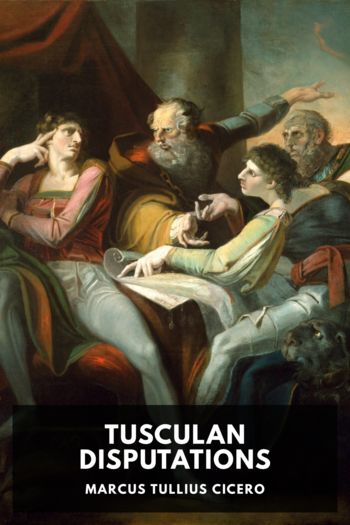Tusculan Disputations - Cicero (red novels TXT) 📗

- Author: Cicero
Book online «Tusculan Disputations - Cicero (red novels TXT) 📗». Author Cicero
Isocrates was born at Athens 436 BC. He was a pupil of Gorgias, Prodicus, and Socrates. He opened a school of rhetoric, at Athens, with great success. He died by his own hand at the age of ninety-eight. ↩
So Horace joins these two classes as inventors of all kinds of improbable fictions:
Pictoribus atque poetis
Quidlibet audendi semper fuit æqua potestas.
Which Roscommon translates:
Painters and poets have been still allow’d
Their pencil and their fancies unconfined.
↩
Epicharmus was a native of Cos, but lived at Megara, in Sicily, and when Megara was destroyed, removed to Syracuse, and lived at the court of Hiero, where he became the first writer of comedies, so that Horace ascribes the invention of comedy to him, and so does Theocritus. He lived to a great age. ↩
Pherecydes was a native of Scyros, one of the Cyclades; and is said to have obtained his knowledge from the secret books of the Phoenicians. He is said also to have been a pupil of Pittacus, the rival of Thales, and the master of Pythagoras. His doctrine was that there were three principles, Ζεὺς, or Aether, Χθὼν, or Chaos, and Χρόνος, or Time; and four elements (Fire, Earth, Air, and Water), from which everything that exists was formed. Vide Smith’s Dictionary of Greek and Roman Biography and Mythology ↩
Archytas was a native of Tarentum, and is said to have saved the life of Plato by his influence with the tyrant Dionysius. He was especially great as a mathematician and geometrician, so that Horace calls him
Maris et terra numeroque carentis arenæ
Mensorem.
Plato is supposed to have learned some of his views from him, and Aristotle to have borrowed from him every idea of the Categories. ↩
This was not Timaeus the historian, but a native of Locri, who is said also in the De Finibus (c. 29) to have been a teacher of Plato. There is a treatise extant bearing his name, which is, however, probably spurious, and only an abridgment of Plato’s dialogue Timaeus. ↩
Dicaearchus was a native of Messana, in Sicily, though he lived chiefly in Greece. He was one of the later disciples of Aristotle. He was a great geographer, politician, historian, and philosopher, and died about 285 BC. ↩
Aristoxenus was a native of Tarentum, and also a pupil of Aristotle. We know nothing of his opinions except that he held the soul to be a harmony of the body; a doctrine which had been already discussed by Plato in the Phaedo, and combated by Aristotle. He was a great musician, and the chief portions of his works which have come down to us are fragments of some musical treatises.
—Smith’s Dictionary of Greek and Roman Biography and Mythology; to which source I must acknowledge my obligation for nearly the whole of these biographical notes. ↩
The Simonides here meant is the celebrated poet of Ceos, the perfecter of elegiac poetry among the Greeks. He flourished about the time of the Persian war. Besides his poetry, he is said to have been the inventor of some method of aiding the memory. He died at the court of Hiero, 467 BC. ↩
Theodectes was a native of Phaselis, in Pamphylia, a distinguished rhetorician and tragic poet, and flourished in the time of Philip of Macedon. He was a pupil of Isocrates, and lived at Athens, and died there at the age of forty-one. ↩
Cineas was a Thessalian, and (as is said in the text) came to Rome as ambassador from Pyrrhus after the battle of Heraclea, 280 BC, and his memory is said to have been so great that on the day after his arrival he was able to address all the senators and knights by name. He probably died before Pyrrhus returned to Italy, 276 BC. ↩
Charmadas, called also Charmides, was a fellow-pupil with Philo, the Larissaean of Clitomachus, the Carthaginian. He is said by some authors to have founded a fourth academy. ↩
Metrodorus was a minister of Mithridates the Great; and employed by him as supreme judge in Pontus, and afterward as an ambassador. Cicero speaks of him in other places (De Oratore ii 88) as a man of wonderful memory. ↩
Quintus Hortensius was eight years older than Cicero; and, till Cicero’s fame surpassed his, he was accounted the most eloquent of all the Romans. He was Verres’s counsel in the prosecution conducted against him by Cicero. Seneca relates that his memory was so great that he could come out of an auction and repeat the catalogue backward. He died 50 BC. ↩
This treatise is one which has not come down to us, but which had been lately composed by Cicero in order to comfort himself for the loss of his daughter. ↩
The epigram is,
Εἴπας Ἥλιε χαῖρε, Κλεόμβροτος Ὥμβρακιώτης
ἥλατ᾿ ἀφ᾿ ὑψηλοῦ τείχεος εἰς Ἀΐδην,
ἄξιον οὐδὲν ἰδὼν θανάτου κακὸν, ἀλλὰ Πλάτωνος
ἓν τὸ περὶ ψύχης γράμμ᾿ ἀναλεξάμενος
Which may be translated, perhaps,
Farewell, O sun, Cleombrotus exclaim’d,
Then plunged from off a height beneath the sea;
Stung by pain, of no disgrace ashamed,
But moved by Plato’s high philosophy.
↩
This is alluded to by Juvenal:
Provida Pompeio dederat Campania febres
Optandas: sed multæ urbes et publica vota
Vicerunt. Igitur Fortuna ipsius et Urbis,
Servatum victo caput abstulit.
↩
Pompey’s second wife was Julia, the daughter of Julius Caesar, she died the year before the death of Crassus, in Parthia.





Comments (0)